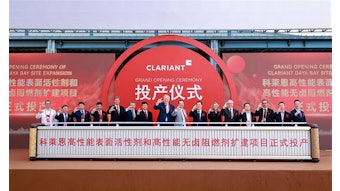Since the companies within Cosmetic Valley are diverse, a common approach was necessary to achieve our goals: we chose eco-responsibility. Following is a combined interview on the subject of eco-responsibility in Cosmetic Valley.
(La version Française est disponible ici./The French version is available here.)
What is Cosmetic Valley’s philosophy toward eco-responsibility?
Cosmetic Valley is an association supported both by local authorities (state, district, cities, etc.) and companies, as part of a French governmental program of “competitive clusters.” Of the 67 French clusters, Cosmetic Valley is rated among the 20 best, with its 196 members in a vertical system that produces “seeds” to the final product, with the aim to improve the capacity of its members to compete better on the international markets. Since the companies within the cluster are so diverse, we needed to find a common approach to achieve our goals and we chose eco-responsibility. This approach has been summarized into a charter and was signed under the eyes of our minister of ecology, Chantal Jouanna, and the president of our senate, Gerard Larcher, on Oct. 16, 2009.
This charter focuses on four primary components:
- Environnent (energy, waste, transport)
- Impact of Products (safety, eco-toxicity, bioaccumulation)
- Continuous Progress Approach (communicating on the action and progress made, making co-workers aware and active regarding eco-responsibility)
- Societal Relations (fair trade, developing human resources, sponsorship).
This charter was immediately adopted by 35 companies, among them some very large groups that will have a very positive impact on the environment due to the large volume of products they sell and ship. Eco-responsibility leads us to a better management of all our actions, taking all aspects into account—both direct (i.e., What is in the product?) and indirect (i.e., How do I make this product in the best way, and what do I do with the waste generated?).
Cosmetic Valley uses the European Union’s Registration, Evaluation, Authorization and Restriction of Chemical Substances (REACH) studies to assess the environmental impacts of substances. This means that Cosmetic Valley and its members do not make a distinction between “natural” or “synthetic” substances, instead we examine how these substances impact consumers and the environment, which gives us a clear scientific base for our final decisions. We will not issue an “approved” list of substances and a “forbidden” list, as we wish to promote “global dynamic progress toward a positive direction.” Furthermore, Cosmetic Valley and its members try to promote locally produced products to reduce the carbon footprint of our activities. Revisiting our production processes leads us to improve various technical aspects: the use of “green chemistry” techniques (i.e., the elimination of dangerous process chemicals), the improvement of global processes (energy reduction), waste reduction, packaging reduction, and so forth.
Of course, we cannot forget how important education is for improving our global condition, and Cosmetic Valley promotes the education of children, adults and individuals of all ages at specific institutions and through organized groups of member companies. Over all, we have found this global approach to be very profitable, generating positive consequences on local employment, workplace safety, waste recycling and energy savings, and it has enabled Cosmetic Valley companies to become even more competitive and profitable, all the more while meeting consumers’ aspirations and values.
What are members doing to support this philosophy? Are there standards or processes in place?
Cosmetic Valley is not introducing any new standards, and it is not a new “label” or “certificate.” It is a way to communicate “global progress toward a positive direction.” We do, however, use conventional environmental certification approaches (such as ISO 14001) as a basis for our evaluation. Cosmetic Valley has set various indicators that enable us to be more than simply a barometer, but to evaluate efforts to ensure a positive move in the right direction. All Cosmetic Valley companies are audited by external experts to earn their “peonies”—the emblematic flower of the Cosmetic Valley and a way to express companies’ efforts and progress within the ethos of Cosmetic Valley.
Why is 2010 the “Year of Biodiversity?” What does this concept mean and how did it come about?
The United Nations Organization named 2010 the Year of Biodiversity in order to make the public aware of the stakes of losing the world’s biodiversity by not acting now to preserve it.
What is L’Herboretum? What is its purpose?
L’Herboretum (www.herboretum.org) is an association that preserves the local biodiversity in a nine-hectare domain in the heart of the Cosmetic Valley, near Orleans, and that educates the public about what biodiversity is—and most of all, that we as human beings are fully part of this diversity. L’Herboretum demonstrates how visitors can manage their environment in a better way, to reap the benefits of their efforts for themselves and their children. It is a first step toward a “hub for biodiversity” to promote exchanges in Cosmetic Valley about this theme.
What does eco-responsibility look like in the future?
Eco-responsibility is the key to our future … Without this approach, we won’t have any future!
Eco-responsibility: A Case Study, by Hervé Sachot, Caudalie:
Why did you sign the Cosmetic Valley charter on eco-responsibility?
We wanted to share ecological attitudes, know-how and experience with our partners. Moreover, it was an opportunity to develop new guidelines, good practices and an accurate “sustainable” framework. We wanted to become a pioneer just as we did in 2006 with our products being entirely paraben-free.
In brief, what current steps toward eco-responsibility are you taking?
There are five key steps:
- Developing Cosm’Ethic formulas: Complete absence of synthetic preservatives (i.e., parabens, phenoxyethanol, etc.), but inclusion of preservatives that are acceptable in foods and that have been approved by the Ecocert organic label. In addition, formulas that contain 0% phthalates and mineral oils, and are not tested on animals. We also signed the PETA agreement.
- The intelligent management of natural resources (water, energy, etc.): For example, we replaced light bulbs with LEDs and installed hot-air pumps.
- Use of responsible materials and reduction/sorting of waste: Specifically, our brochures are printed on paper derived from sustainable forests (PEFC/FSC); and paper, cardboard boxes, plastic, glass and batteries are sorted, among other practices.
- Reducing the volumes of paper, cardboard and plastic used: For instance, packages are printed on both sides, with, for example, instructions for use. In addition, up to 40% less plastic is used in capsules, pumps and jars; and 150 kg of plastic was saved thanks to Vinexpert samples or “banderolage.”
- Transportation considerations: We have reduced the volume of the products carried, thus reducing the emission of CO2 by 20%.










